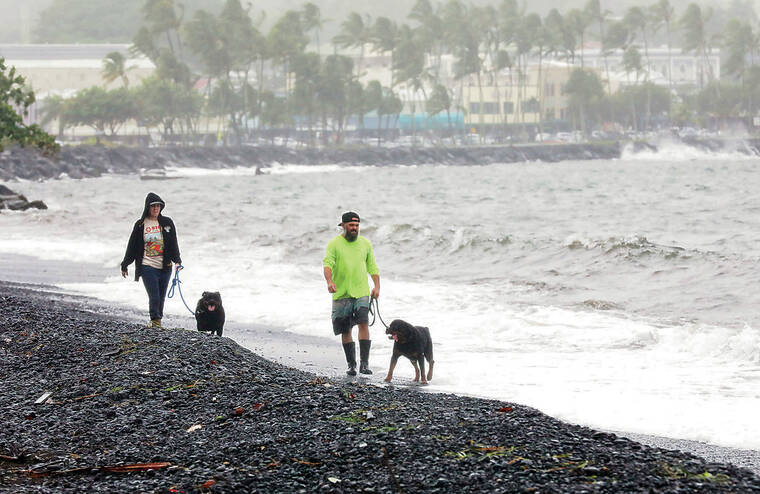Hurricane Hone ends most of Hawaii island’s drought

KELSEY WALLING / HAWAII TRIBUNE-HERALD
A couple walked their dogs down Hilo Bayfront Beach Park as the surf picked up from Tropical Storm Hone on Aug. 24.
One effect of Hurricane Hone’s passage to the south of the Big Island in late August was to take almost all of the island out of drought conditions.
According to the National Weather Service’s drought monitor, a portion of Mauna Kea’s slopes remain in what weather watchers call “abnormally dry” conditions. But areas on the leeward side that were in either moderate drought or severe drought conditions are no longer in drought, at least for now.
“It’s quite a bit better,” said Kevin Kodama, senior service hydrologist for the National Weather Service in Honolulu. “I talked to a rancher down in the Kau district, and he said he’s got regrowth. One that I talked to on the Hamakua Coast said he’ll be good until the wet season.
“It’s a good thing, because as soon as Hone went by, it dried out again, and it’s been pretty dry since then.”
Because of Hone, almost all Hawaii island rain gauges posted above-average rainfall totals in August.
Outer rain bands from the tropical cyclone produced a prolonged period of heavy rainfall along the island’s east- and southeast-facing slopes on Aug. 24 and 25, bringing an abrupt end to drier-than-normal weather that had settled in over the island in the previous couple of months.
Don't miss out on what's happening!
Stay in touch with breaking news, as it happens, conveniently in your email inbox. It's FREE!
According to Kodama, the highest rainfall total for the month came from a non-NWS observer in Volcano village, who reported 35.94 inches. The observer’s manually operated gauge recorded 33.58 inches during Aug. 24 and 25.
Among official NWS gauges, the highest total in a populated area was in Hakalau, north of Hilo, with 30.25 inches, more than four times its average August rainfall.
Other significant windward rainfall totals, all above their August norm, include Waiakea Uka, 27.89 inches; Mountain View, 27.79 inches; Glenwood, 25.94 inches; Papaikou, 20.39 inches; Piihonua, 19.63 inches; Pahoa, 18.59 inches; Honokaa, 13.32 inches; and Hilo International Airport, 11.59 inches.
“You look at the totals and they’re very, very high,” Kodama said. “But the flood impacts on the windward side — upper Puna, Hamakua, South Hilo — really weren’t all that bad. I think what saved the windward side from major flooding, considering the amounts, were that the rainfall rates were mostly well behaved, less than an inch per hour. It just lasted a long time.”
Some leeward sites received heavy rainfall, as well — especially in Kau, closest geographically to where the eye of the storm passed near the island.
Lower Kahuku recorded 21.18 inches of rain, Kapapala Ranch received 14.08 inches and Pahala reported 13.11 inches for August.
“Initially, that storm was affecting the windward side, but as soon as the center passed the Big Island, the wind would switch around once the center got farther west,” Kodama said. “Once the winds went to the southeast, Kau got a downpour. You had rain rates of 2 or 3 inches an hour, and that’s when the flooding got pretty bad.”
The former “Hobbit House” bed-and-breakfast in Waiohinu, now the home of 78-year-old Sherry Mastandrea and her son, Jacob Satterwhite, sustained major damage from a mud- and rockslide caused by the rain. As of Friday a GoFundMe page titled “Restore Sherry’s Home After Devastating Flood” had raised $8,085 of a $40,000 goal.
The most significant road closures due to flooding occurred on Highway 11 at Kawa Flats, plus Cane Haul and Wood Valley roads near Pahala. North Kulani Road near Mountain View also was closed due to the overflow of a nearby floodwater retention basin. Several secondary roads in rural areas also were closed due to flooding.
All four gauges in the Kona coffee belt, which experiences its rainy season in the summer, also had higher-than-average totals in August. Kealakekua led the way with 9.62 inches, followed by Honaunau with 8.67 inches, Waiaha with 7.05 inches and Kainaliu with 6.99 inches.
Rainfall totals in other West Hawaii locations include Kahua Ranch with 9.91 inches and Upolu Airport with 5.71 inches. Ellison Onizuka Kona International Airport in Keahole registered just 1.13 inches, but that’s more than twice its usual August rainfall.
Despite the abundant rainfall, the only August record broken was at Kahua Ranch, with Honokaa boasting its highest August total since 1995.
The low number of records broken is due to the passage of Hurricane Lane south of the island in 2018, when its outer rain bands drenched the island for four days.
“During Lane the worst of the flooding happened when you had the rain going for more than a day, and then you had this intense burst of rainfall. That’s when the Wailuku River really came up. Lane pretty much tops everything on the Big Island, as far as rain.”
After Hone’s passage the remnant of Tropical Cyclone Gilma passed just north of the state on Aug. 30. Moisture associated with the remnant produced enhanced rainfall along the east-facing slopes of the Big Island, but nothing like the totals produced by Hone.




